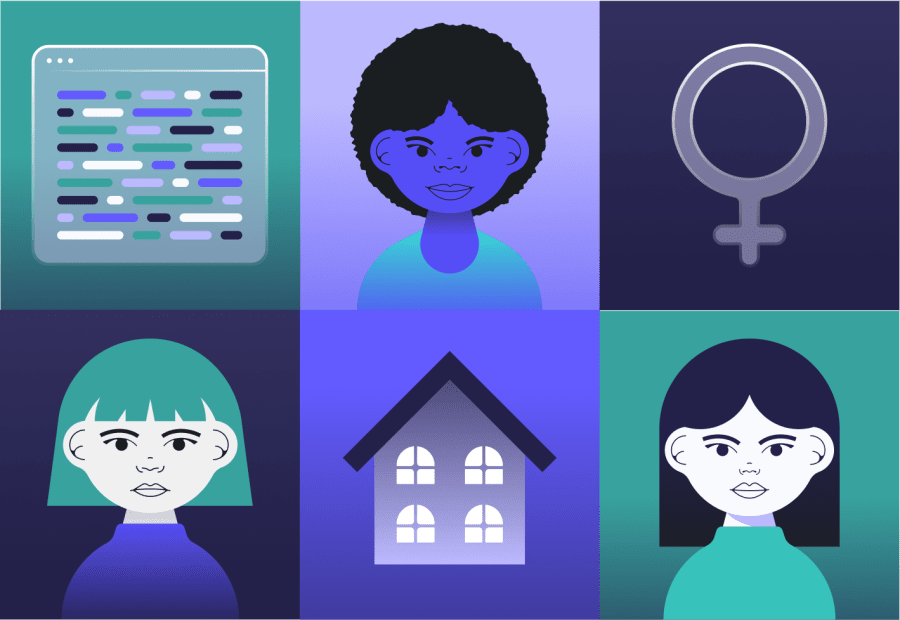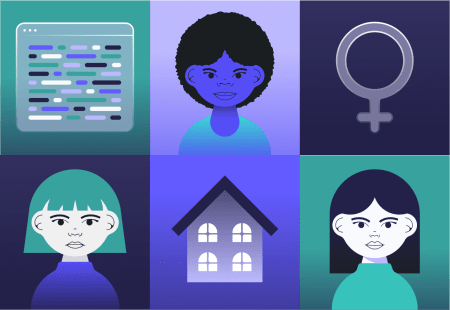Working in tech can be rewarding, and the pay can be pretty good. But for women in tech, they must also navigate the gender gap in a notoriously male-dominated field. Despite the obstacles they face, many of them want to stay in the field — but they also want change. We asked the incredibly talented women at PDQ about the areas of change that mattered most to them. Here’s what they shared.
1. Pay transparency
Women in tech want companies to be transparent about the salaries they offer — and for good reason. In job interviews, without being given salary information, individuals tend to negotiate off their own salary expectations, which are usually based on previous jobs. A 2023 State of Wage Inequality in the Tech Industry report shows that Black and Hispanic women typically set lower salary benchmarks (because they’re paid less on average) — and the cycle continues.
The National Women’s Law Center argues that pay transparency can reduce the risk of gender bias and wage discrimination in job offers, giving women a better chance at getting fair pay. Including salary ranges in job postings also allows candidates to make informed decisions about the tech jobs they apply for and empowers them with vital information to negotiate more effectively.
Pay transparency laws and the right to discuss wages
In the U.S., pay transparency laws differ from state to state. As of now, only 10 states have pay transparency legislation in place. Alternatively, the National Labor Relations Act (NLRA) gives employees the right to discuss their wages openly, which is another way to find out if you’re getting fairly compensated.
Within organizations, pay transparency among employees can be a sensitive issue. The numbers alone don’t provide enough context. For instance, some roles with the same titles may have different responsibilities, and some individuals may have been hired to meet specific business needs at a point in time — which can account for salary differences.
Still, companies can create a culture where employees feel safe to advocate for themselves by speaking up or reaching out to their managers for support. And companies should, of course, pay women fairly in the first place.
2. Caregiving support and benefits
In the U.S., women make up 56% of caregivers who also work full time. So it’s no surprise that women want more comprehensive and inclusive caregiving support and benefits. Here are three key benefits that they want companies to provide.
Paid maternity leave
Across Europe, mandatory paid leave for new mothers ranges from 6 weeks (Portugal) to 43 weeks (Greece). In the U.S., the number is zero, and that needs to change. Working mothers need ample time to care for a new child, and women who have just given birth need time for their bodies to recover.
“At a previous job, I had 2 weeks of maternity leave (which they eventually scraped). That’s not enough time for new mothers. I don’t think I even remotely resembled a human until at least a month after giving birth — and I definitely wasn’t a pulled-together one until at least 10 to 12 weeks after having my daughter.
“I ended up going unpaid for another 10 weeks and was lucky that my family was in a position to do this, but not everyone is.
“I also want people to be conscious of the language they use when talking about maternity leave. It’s not a vacation. Saying things like ‘Oh, what will you do with all that time off?’ is just not cool. I was working my butt off and barely sleeping, so I didn’t appreciate the jokes about whether I took up a new hobby, like knitting, while I was gone.” — Katie Gosline, paid media manager at PDQ
More inclusive paid caregiving leave
Paid caregiving leave should cover family care as well. And it should be offered not just to birthing parents and primary caregivers but also to adoptive parents, guardians, and secondary caregivers (e.g., spouses).
Flexible work models
Women want the flexibility to adjust their work around their caregiving duties. That could mean being able to work from home, step out of a meeting to care for a sick child, or schedule time for daily school pickups and drop-offs.
Shellie Robertson, PDQ’s Director of Engineering, wants companies and teams to normalize the practice of accommodating employees (both men and women) who need to integrate caregiving tasks into their workday. If someone needs to step out for 30 minutes to help their kid with homework or take an elderly family member to the doctor, they should be able to without worrying that it’s going to cost them at their next performance review.
In one decade-long study, researchers found that supportive workplaces result in healthier, more productive employees (men and women) — and they, in turn, raise children with better cognitive skills and fewer behavioral problems.
A Center for American Progress (CAP) report found that 51% of Americans across 22 states live in childcare deserts (areas with no licensed childcare services) — which means someone at home needs to take care of the kids.
3. More representation across the tech field
Women want more representation across individual and leadership roles in the tech industry. While there is more room for women and women leaders in the technology sector now than there was 20 years ago, the numbers show that a gender gap still exists — especially for women of color.
Women make up only 14% of leaders in global tech companies.
Women make up less than half of the workforce at Amazon, Meta, Apple, Google, and Microsoft.
Only 22.7% of IT professionals in the U.S. are women.
Black women make up only 3% of computing professionals while Hispanic women make up 2%.
The Equation for Equality Index 2023 found that the proportion of women of color in the tech sector increased by only 1% (from 5% to 6.25%) across a 10-year period.
Representation matters because it proves to women what they can achieve if given a fair opportunity. In an Eagle Hill survey of 1,400 U.S. workers, a majority of respondents said that it’s important that potential employers had employees (63%) and leaders (59%) that they identify with.
Representation also has a generational impact. When girls see tech women succeed in their roles, it tells them that one day they can, too.
4. Equal opportunities for career advancement
Insights from McKinsey’s Women in the Workplace 2023 report show that women are more ambitious than ever: 81% of women surveyed want to be promoted, and 75% of women under 30 want to advance to a senior leadership position.
Women in tech are no different. Smart, tenacious, and resilient (they have to be!), women want to grow their skills and advance their tech careers — without having to deal with gender-biased malarky. In simple terms, they want to be respected for their technical abilities, experience, and opinions at work. That includes being given a fair shot at the same opportunities as men who are their peers — and being rewarded fairly for their performance.
“In day-to-day work, I like to be taken seriously and have my input valued, be respected, and have room to grow. I find that very fulfilling.” — Kim Sowards, software test engineer at PDQ
In the male-dominated tech sector, women want men in leadership positions who treat them with respect and who are willing to support, mentor, and advocate for women throughout their careers.
5. Merit-based, anti-bias hiring practices
In the tech field, women are just as qualified as the men. When interviewing for a tech role, they want companies to consider their skills, capabilities, and experience — and not their gender. While hiring managers should not disregard candidates for a technical role simply because they are women, making women token diversity hires is just as unwelcome.
“Women in tech don’t want special treatment. Heck, women who choose to go into a technical field understand that to be recognized as competent and respected professionals, they not only have to be as good as, but better than their male counterparts.” — Andrea Pepper, content engineer at PDQ and former sysadmin
Instead, companies should hire based on merit. And yes, merit-based hiring policies can (and must) coexist with holistic efforts to improve diversity and inclusion across the organization.
The good news is that more companies are trying to do better in addressing gender bias. A study by talent development consultancy Wiley Edge found that 60% of the businesses surveyed provide anti-bias training for hiring managers and other staff. More companies are also establishing anti-bias measures, like blind resumes, neutral job descriptions, and requesting more diverse pools of candidates from recruiters.
PDQ takes gender diversity, equity, and inclusion very seriously. Led by our amazing People Ops team, we’re constantly working on ways to better support women in tech across our organization and local communities.
In the end, I asked Shellie to share one thing she wanted most as a woman in tech. And she said, “What I want is a world where tech women don’t even have to talk about gender issues anymore because it’s no longer a problem like it is today.” And we couldn’t agree more.




